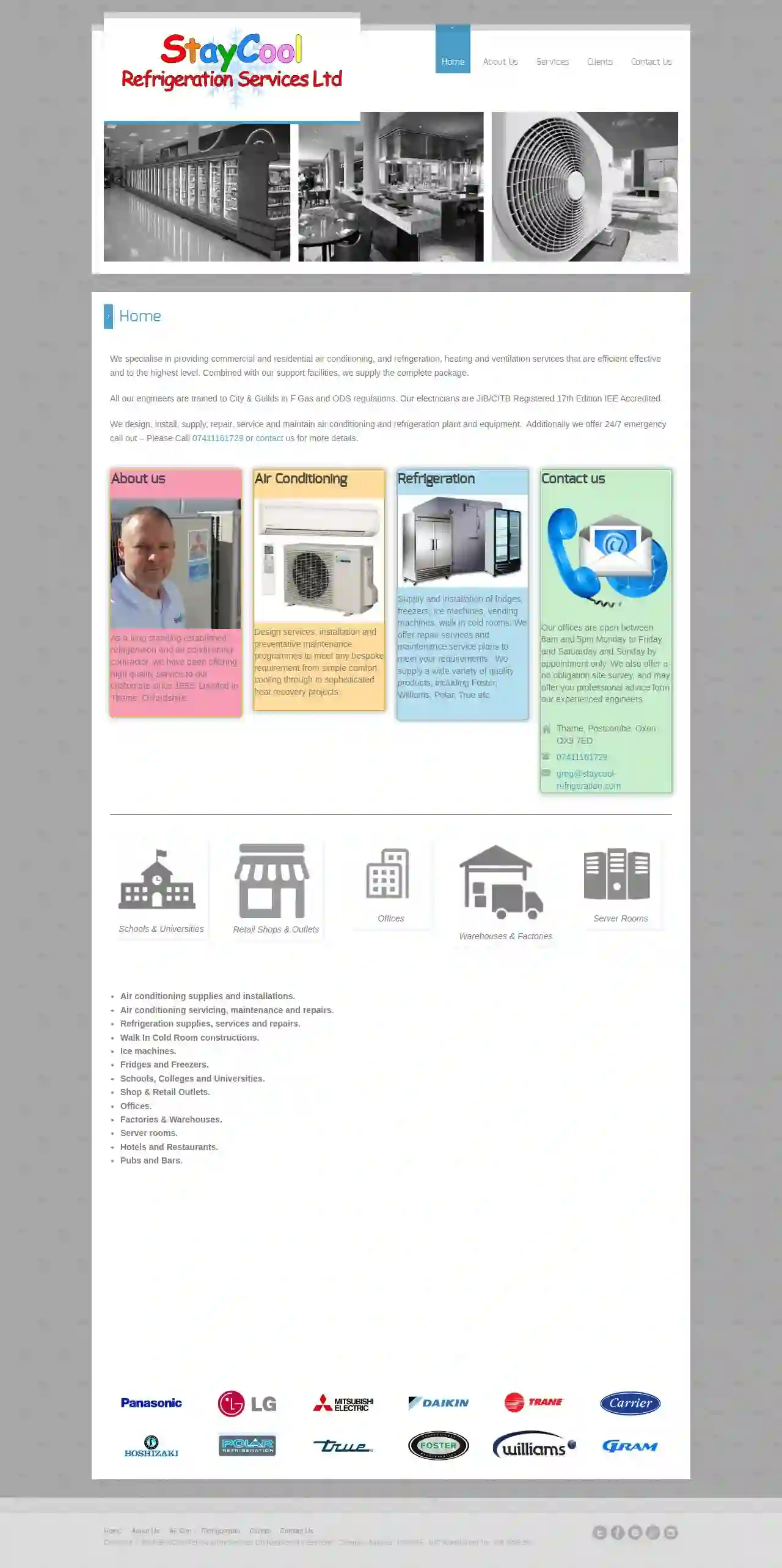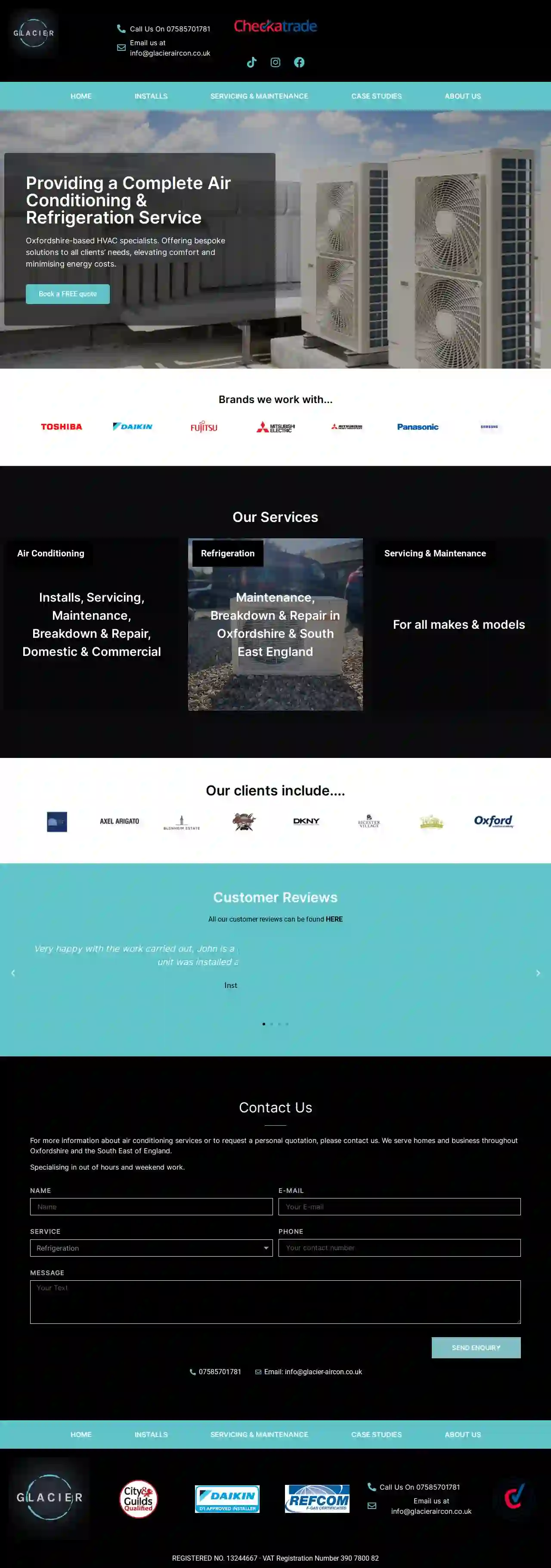Heat Pump Installation Oxford
Find top Heat Pump Installation in Oxford
Get up to 3 Heat Pump System Installation quotes for your project today! Compare profiles, reviews, accreditations, portfolio, etc... and choose the best offer.

Oxon Energy Ltd
4.830 reviewsThe Old Stables, Valley Farm, Bix Bottom, Henley on Thames, Oxfordshire, RG9 6BJ, GBSince 2014, Oxon Energy has been providing renewable energy solutions to homes across Oxon, Berks, Bucks, Surrey, Hants & West London. We design, install, commission and maintain air source, ground source and water source heat pumps, underfloor heating, air conditioning/air to air heat pumps, MVHR, solar PV, EV car charging facilities and home battery storage - everything your home needs to go greener! Our team are experienced and qualified professionals who can provide you with personalised, energy efficient systems that help heat and power your home whilst reducing your carbon footprint without compromising your comfort. We are MCS, RECC, REFCOM and Trustmark accredited, meaning we comply with the highest standards of quality and care within our industry. We're also proud members of the Ground Source Heat Pump Association and the Heat Pump Federation, putting us at the forefront of developments and innovation in heat pump technology. As a multi award-winning company, we pride ourselves on offering exceptional customer service and aftercare. Our commitment to approved quality management schemes means that we can help you to benefit from grants such as Ofgem’s Boiler Upgrade Scheme, or the banking industry’s own greener homes grants and loans. We can help you to access any funding for which you are eligible and ensure your system is as efficient as it can be - because we believe energy shouldn’t cost the earth.
- Services
- Why Us?
- Accreditations
- Our Team
- Testimonials
- Gallery
Get Quote
G & O Engineers
4.454 reviewsWitney, Oxfordshire, 1 Cotswold Business Park, OX29 0YB, GBG&O Engineers Ltd is a professional building and home maintenance services company based in Witney, Oxfordshire. We offer a wide range of services including heating, plumbing, electrical, and building works, as well as 24/7 emergency call-out service. Our team of specialist engineers and builders are fully qualified and well-versed in taking care of any size job, whether it be for a commercial or domestic property. We cater for both domestic and commercial clients and provide free no-obligation quotes for all our services. Our company is Gas Safe, Oftec, and Chas registered, and we take pride in being your one-stop solution to anything that might go wrong with your property.
- Services
- Why Us?
- Accreditations
- Testimonials
- Gallery
Get Quote
ACREAIR
522 reviewsUnit C, Three Michaels Yard, Carterton Ind Est, Carterton, OX18 3EZ, GBWest Oxfordshire's premier Vehicle Air Conditioning Specialists A warm welcome awaits you when you visit ACRE Air A family-run business established in 1978 with a background in farm vehicles and specialist air conditioning systems, they now provide servicing for any vehicle with an air conditioning system, and/or refrigeration systems. ACRE have been car air conditioning specialists for over 40 years, and provide car air con services to the public, trade, local garages and main dealers. Recharge your Vehicle We offer vehicle recharge and re-gassing services in our brand-new workshop Parts & Accessories available Contact us for our full range of dyes and high-performance oils and components Anti-Bacterial & Odour Removal Treatment removes the bacteria in the system and leaves it smelling fresh and clean Leak Detection and Diagnosis Ask about our free check and diagnostic service Now in New Premises! Don't worry, we've moved into a great new space next door. You get a relaxing place to wait while your vehicle gets the five star treatment. ACRE Air service all types of machinery with air conditioning units. The R1234yf gas is not available anywhere else locally! AIR-CON for… Cars At ACRE Air we offer both R134a and the newer R1234yf gases. Ask about our Anti-Bacterial & Odour Removal Treatment - perfect for air-conditioning systems over 3 years old. Say goodbye to stale, musty air! AIR-CON for… Agricultural Machinery Recharge Service Repair ACRE Air offers a mobile service for all agricultural air con needs. AIR-CON for… Commercial Plants We aim to keep your vehicle on the road and cooling efficiently, repairs booked to suit your work schedules. We cover both frigerated vehicles and plant equipment. What our customers say about ACRE Air… E. Smythe Highly recommended, extremely professional, fantastic value and we'll not be going anywhere else for Air Con based services in the future. Thanks Ian and Mandy! F. Sieczkowski Very good garage. Problem has been sorted out in a few minutes and now everything is working as it should. Good price. Strongly recommend. R. Brooks Air con in my car decided to stop working on what happened to be the hottest day of 2020 so far (30°). Phoned them up, dropped car off, picked up an hour later all sorted and great price. Excellent service. S. Merritt Ian diagnosed the problem with my BMW air conditioning very quickly. I booked the car in to have it repaired and it was finished before lunch time. Superb service, excellent knowledge and very professional. J. Booth Ian arrived earlier than expected. Totally professional / courteous / efficient and excellent value. Would recommend whole-heartedly ACRE Air. M. Fisher Fantastic place. Incredibly reasonable price for an AC regas and took their time to find any suspected leaks. Very happy indeed. J. Duncan Couldn't recommend enough. Quickly identified a leaking compressor, promptly fitted and up and running. If anything, car is super cold on a hot sunny day now if that was ever a problem :) Fast and effective communication throughout and sensible prices. Get in touch with ACRE Air We are open Monday to Friday : 8.30am – 5.30pm (Saturday – By Appointment) Visit Unit C, Three Michaels Yard, Carterton Ind Est, Carterton OX18 3EZ Email [email protected] Call 01993 841810 Unit C, Three Michaels Yard Carterton Ind Est Carterton OX18 3EZ © Copyright 2024. All Rights Reserved West Oxfordshire's premier Vehicle Air Conditioning Specialists site by treaclesponge
- Services
- Why Us?
- Our Team
- Testimonials
- Gallery
Get Quote
Cotswold Heating Services
55 reviewsCarterton, GBWelcome to the Cotswold Heating Services website. My name is Gavin Hudson, and I specialise in servicing and repairs for Gas, Oil & LPG boilers and heating systems with a high level of customer care and workmanship. Boiler & Heating services in Carterton, Oxfordshire and surrounding areas. We offer servicing for all gas, oil and LPG boilers and appliances. We also specialise in fault finding, diagnosis and repair of boilers, appliances and heating controls. As part of our service we also offer annual service reminders, and guarantee appointment times so you don’t have to stay in all day waiting. We are a Gas Safe registered business and install, service, repair and commission all makes of gas boilers, cookers, hobs, gas fires and water heaters. We are also registered with OFTEC to install, service, repair and commission oil boilers and to carry out oil tank installations. We have specialist knowledge and experience in servicing and repair of AGA and Rayburn cookers. We also provide a power flushing service, removing scale and sludge from central heating systems to improve efficiency. We offer domestic and commercial Landlord’s Gas Safety Certificates and domestic Landlord Oil Installation Safety Checks. We cover most of Oxfordshire and some areas of Gloucestershire.
- Services
- Why Us?
- Accreditations
- Our Team
- Gallery
Get Quote
Staycool Refrigeration Services Ltd
51 reviewsSundial, 2, London Road, Thame, OX9 7ED, GBStaycool Refrigeration Services Ltd is a long standing established refrigeration and air conditioning contractor, offering high quality service to customers since 1995. Located in Thame, Oxfordshire, we proudly serve the home counties of Buckinghamshire, Berkshire, London, Surrey, West Sussex, and Oxfordshire. We specialise in providing commercial, residential and transportation refrigeration and air conditioning, heating and ventilation services that are efficient, effective and to the highest level. Our engineers are trained to City & Guilds in F Gas and ODS regulations, and our electricians are JIB/CITB Registered 17th Edition IEE Accredited. We design, install, supply, repair, service and maintain air conditioning and refrigeration plant and equipment. Additionally, we offer 24/7 emergency call out. Our offices are open between 8am and 5pm Monday to Friday and Saturday and Sunday by appointment only. We also offer a no obligation site survey, and may offer you professional advice from our experienced engineers.
- Services
- Why Us?
- Accreditations
- Our Team
- Gallery
Get Quote
Oxford Refrigeration & Air Conditioning Ltd
32 reviewsOxford, GBOxford Refrigeration and Air Conditioning Specialists in the installation, maintenance and servicing of refrigeration, air conditioning, plumbing and ventilation systems. For Commercial and Industry Give your business an ORAC service Commercial and Industrial services For Residential Improve your comfort at home with our services Residential Services 0% VAT on residential heat pumps Our Services Commercial and Residential services All services Air Conditioning and Heating more Refrigeration more Service and Maintenence more Plumbing and Ventilation more Our Projects See our work in action See all projects Air conditioning and heating Chiller Replacement Air conditioning and heating New Install For A Customer Near Eynsham Air conditioning and heating Headington School Library recently completed Air conditioning and heating New Installation Completed In Headington Air conditioning and heating New Installation Completed Near Thame Air conditioning and heating New Installation Completed at a High-end Residential Property in London Air conditioning and heating New Installation Completed at Cumnor Hill, Oxford Air conditioning and heating New Installation Completed At A&A Hairdressers Air conditioning and heating New Installation Completed for City of Oxford College Air conditioning and heating New Installation Completed at Oxford Technology Park Air conditioning and heating New Installation at Exeter College, Oxford Air conditioning and heating New Installation Completed at Baton Restaurant Air conditioning and heating New Installation Completed at Oxford University Estates Department Offices Refrigeration Replacement water chillers Air conditioning and heating Installation of air conditioning at a flag ship hotel Air conditioning and heating Heat pump air conditioning design and installation for a garden office Air conditioning and heating Design and Installation of our services at Heyford Park Air conditioning and heating Our services provided for Oxford laboratory equipment manufacturer Air conditioning and heating Maintenance contract at a Oxford-based Pharmaceutical Company Air conditioning and heating Replacement of R22 air conditioning systems Looking for a new air conditioning unit Feel free to use our price calculator to get an idea of how much your project could cost based on your requirements Pricing calculator TRADE ASSOCIATIONS Latest Insights, opinions and advice See all news Commercial and Industrial Safewell Ltd and Oxford Refrigeration Residential New service and maintenance package Commercial and Industrial Asbestos Awareness Residential SAFEcontrator approved Book a free survey Enjoy a free survey and receive expert advice on your residencial or commercial’s needs Book a Survey Services Why ORAC Case Studies Latest Contact Privacy and Policy Credit account application Purchase T&Cs Conditions of Supply © 2024 Orac Oxford Ltd. Oxford All rights reserved. Bespoke website by mwb-agency.com We use cookies and other tracking technologies to improve your browsing experience on our website, to analyse our website traffic, and to understand where our visitors are coming from. I accept I don't accept Learn more
- Services
- Why Us?
- Gallery
Get Quote- St
Star Refrigeration Oxford
1Oxford, GB- Services
- Why Us?
Get Quote - Pr
Priceless Plumbers Ltd
4.731 reviewsOxford, GB- Services
- Why Us?
Get Quote 
APV Boiler Services Ltd
4.317 reviews32 Yarnton Road, Kidlington, OX5 1AT, GBAPV Boiler Services Ltd is a reputable plumbing and heating engineers company operating in Oxford and surrounding areas. Established since 1987, we have the knowledge and expertise needed to ensure that you receive nothing but the best service. Our reputation has been developed through hard work and reliability, which is why we are the area's number one choice for plumbing & gas related work. We offer a wide range of services, including boiler installations, boiler replacements, bathroom installations, general plumbing, boiler servicing & repairs, central heating installations, gas safety inspections, landlord safety certificates, and powerflushing. Our team of experienced and helpful staff will always be happy to assist you. For a free estimate, please call us today on 01865 377264 or simply complete the form.
- Services
- Why Us?
- Accreditations
- Gallery
Get Quote
Glacier Air Conditioning Ltd.
510 reviewsOxford, GBOxfordshire-based HVAC specialists. Offering bespoke solutions to all clients’ needs, elevating comfort and minimising energy costs. Providing a Complete Air Conditioning & Refrigeration Service.
- Services
- Why Us?
- Testimonials
- Gallery
Get Quote
Over 16,895+ HVAC Businesses onboarded
Our HVAC companies operate in Oxford & surrounding areas!
HVACCompaniesHub has curated and vetted Top HVAC Contractors near Oxford. Find a top & reliable business today.
Frequently Asked Questions about Heat Pump Installation
What is a heat pump?
What is the difference between an air source heat pump and a geothermal heat pump?
Air source heat pumps extract heat from the outside air. They are more affordable initially than geothermal heat pumps, but their efficiency decreases in very cold climates.
Geothermal heat pumps use the stable temperature of the earth as their heat exchange medium. They are more expensive to install due to the ground loop system, but their performance is more reliable even in very cold or hot climates.
What is a dual-fuel heat pump system?
How much does heat pump installation cost?
What is a heat pump?
What is the difference between an air source heat pump and a geothermal heat pump?
Air source heat pumps extract heat from the outside air. They are more affordable initially than geothermal heat pumps, but their efficiency can be affected by extreme outdoor temperatures.
Geothermal heat pumps use the ground as their heat source. They are more expensive to install due to the underground piping requirements, but their performance is more reliable even in very cold or hot climates.